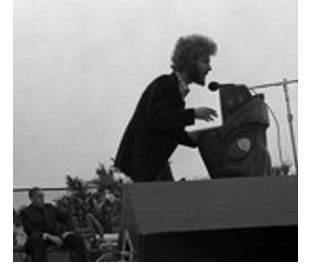The Accidental Urbanist
From 2006 to 2014, I was the press officer for the International Institute for Environment and Development. My many extraordinary colleagues there included ‘accidental urbanist’ David Satterthwaite. To celebrate the 50th anniversary of his joining the institute, IIED asked me to write a long-read on his career and legacy, interviewing David and many of the people who know him best. You can read the intro below. There’s a link to the full article at the end.
Summer 1974: A young Englishman with a halo of curly red hair and matching beard was blissfully unaware that his life was about to change forever. David Satterthwaite, 23, had spent two months working at a forestry camp on Vancouver Island, Canada, with friends who had a contract to plant half a million trees. “It was called the Flatulent Silviculture Cooperative,” he says. “Because we ate so many beans.”
Satterthwaite had graduated the previous year from Bristol University where, by his own admission, he did “almost no work” and scraped a third-class degree in history and ancient history. His passion was music, not academia. He played guitar and mandolin in bands and had been his student union’s entertainments officer, booking artists from David Bowie to the Velvet Underground.
A career with music and musicians beckoned. Satterthwaite planned to get a master of business administration degree in arts, media and entertainment management at York University in Toronto. But to deal with the paperwork he needed to go home to England, having planted 30,000 trees. “With the money in my pocket I went to a guitar shop and got the most beautiful old Martin guitar,” he says. Arriving unannounced at his parents’ home near Midhurst, West Sussex, his fate took a turn.
Visiting Satterthwaite’s parents that day was Barbara Ward, the economist, journalist and founding director of the recently established International Institute for Environment and Development (IIED). Two years earlier, she had played a key role in the UN Conference on the Human Environment and had co-written its core text, a book called ‘Only One Earth’ that laid the ground for sustainable development. Time magazine would call her one of the 20th century’s most influential visionaries.
Ward had come to talk to Satterthwaite’s mother about an event for the local Women’s Institute. When she learned that Satterthwaite was at a loose end, she offered him three months of work, organizing her library. Three months turned to six, and then a year. Ward had soon asked Satterthwaite to synthesize material to help her write her next book. He joined IIED and never looked back. It would become his institutional home for half a century.
His chance encounter set him on a journey to informal settlements – commonly and often pejoratively called slums – in Africa, Asia and Latin America. It would lead him to speak at intergovernmental meetings, advise UN agencies and produce a prodigious output of research. He would forge partnerships with grassroots organizations across the world and teach a new generation of students, all while helping to shape global agendas for addressing urban poverty, environmental health issues and climate-related risks in the global South…
You can read the rest of the article on the IIED website: Urban legend: one man, 50 years, countless seeds of hope





